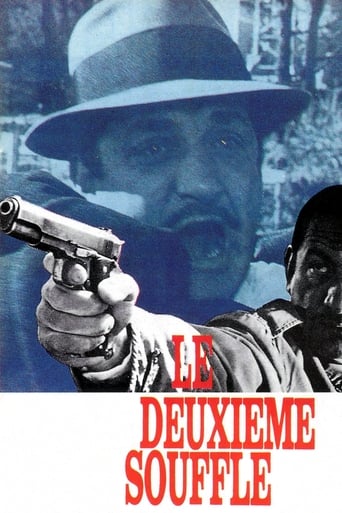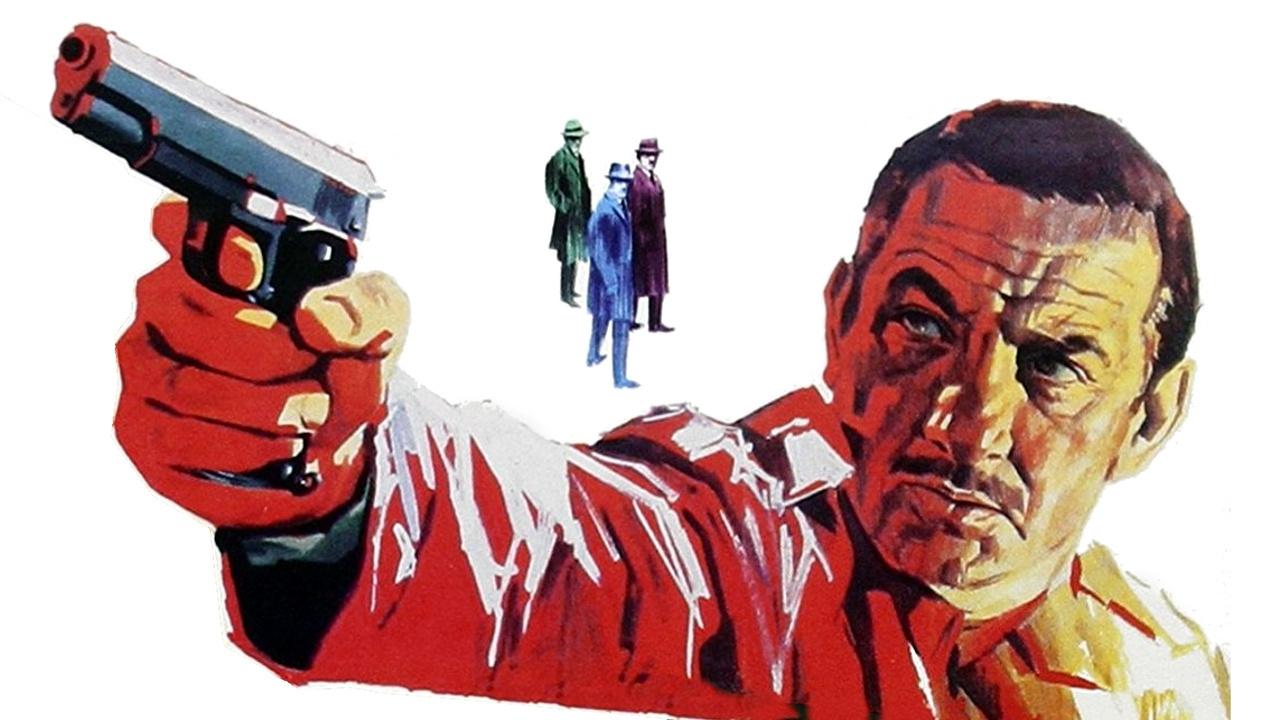evening1
This is the kind of film about which one yearns to have a conversation. I viewed it myself, on Turner Classic Movies, so this review is my effort to make some sense of a superlative but puzzling viewing experience. Gu, whose chiseled mug seems made for this role, is a protagonist unlike any other. We sympathize with him from the start, as his lack of athleticism threatens his life of crime in the earliest frames of this dusky film. What is he doing, leaping across tall buildings -- anyway? Director Melville never quite spells it -- or anything else in this film -- out. But we care for Gu from the start. Yet he is a cold-blooded killer of guys both good and bad. With sniper-like sangfroid, he thinks nothing of taking out a motorcycle cop accompanying an armored car. As the doomed Inspector Fardiano sneers, is he planning on adopting two slain cops' five kids? Somehow Melville makes us care about this villain, whose only smile he reserves for his glamorous and enigmatic sister Manouche (Christine Fabrega). "You deserved better," he tells her toward the end of the movie. Earlier, they embrace passionately. What gives here?? Again, hints are the most we receive from Melville. Ventura's performance is first-rate. Our eyes never stray from his presence, whether he is commandeering a pair of hapless petty thieves who have come to threaten Manouche or allowing himself, fatefully, the luxury of chewing on a candy at a game of petanque near the Mediterranean coast. Equally compelling is Commissioner Blot, played with unceasing panache by Paul Meurisse, who, only the year before, appeared in "Diabolique."Blot's character, like all the others in this film, is somewhat puzzling. He seems confident about outsmarting the bad guys -- "not everyone can have an inquiring mind." Yet, as Manouche predicts, he and his men in blue are easily duped. Witness the incredible scene when Gu, seemingly comatose from torture as he lies in a hospital bed, gives his badged overseer the slip. Yes, Manouche knew of what she spoke. Once the evil and reputation-obsessed Gu receives his comeuppance, Blot deprives Manouche of a bit of succor. Apparently he realized she wasn't as clean as she came across. Yet he drops the loathsome notebook on the ground for the benefit of the press corps. One shudders at the implications of that move. Won't it serve to stir the pot, keeping the bad guys and the cops at each others' throats? Well, without that I guess we wouldn't have noirs and policiers. The never-ending cat and mouse game carries on. And what of the platinum? Gu hid his share well. Perhaps, in a way, he provided for Manouche and her stolid bodyguard Alban (Michael Constantin) after all.I have seen one other noir by Melville ("Le Doulus"), which was interesting but made far less sense than this production. Melville is a director I'd definitely like to follow -- ideally in the company of other film buffs who savor examination and discussion!CODA: If this film seems to really "get" the bad guys, maybe that's because the author of the novel that inspired it was a truly evil man. Read the Wikipedia entry for Jose Giovanni and weep -- or perhaps feel guilty for liking this film so much.
Myriam Nys
A middle-aged gangster with the deceptively nice and normal name of Gustave (or "Gu") escapes from prison and returns to his habitual environment, to wit the environment of heavy-duty professional crime. He arrives bang in the middle of a gang war involving a number of old friends, enemies and frenemies. Gu is about to become both actor and pawn in a series of elaborate cat-and-mouse games pitting gangsters against police and gangsters against gangsters.An excellent movie, both elegant and incisive, with a prize cast and prize performances. I don't know if it's realistic - kind Fate has kept me far, far from the world of French gangsterdom - but it certainly feels and sounds realistic : one gets a genuine sense of watching people for whom serious violence is not only a career, an heritage and a belief system, but also an automatic mindset. The atmosphere hangs as heavy as cigarette smoke and the dialogues are so sharp that you could use them to cut your hair. The sets and locations have been chosen with enormous care, conjuring up visions of prosperous yet tacky nightclubs, near-convincing imitations of "bourgeois" respectability or once happy family homes turned into hiding places for criminals on the run, like women of a good background fallen upon hard times and forced into street-walking.Riveting, addictive viewing.
Ore-Sama
What I find is that a great film of great length, whether slow paced or not, is life a sheep in wolf's clothing. However intimidating a run time may look, the greats go by quicker than many 90 minute efforts. Whether it's Solaris(1972) and Andrei Rubev(1966) in just short o9f 3 hours, or Seven Samurai(1954) and Godfather II(1974) in excess of 200 minutes, there films to me never feel their length and always justify it. While many have commented on "Second Wind" (using the English title for simplicity's sake) running time, rest assured, it too is deceptive.The film opens abruptly into the finale of an escape sequence from prison, giving no breathing room as you are thrown into the action. One man dies but the other two make it out, as we go to an atmospheric opening credits sequence of the two running through the forest, with little to no music. Only one of the escapees is of concern to us, Gustave Minda (regularly called Gu), put behind bars for a train robbery gone wrong. He comes back to his old stomping grounds, rescuing his sister and loyal friend from a pair of thugs. Their murder further brings heat down on him in a case led by Blot, a wise cracking but crafty inspector. Many plot points are running intersect, including a battle over the cigarette business and the forming of a heist, the latter of which Gu is drawn into in order to have some money when he leaves the country. While there are a lot of characters and going ons to keep track of, as long as one is paying attention, following along is simple, as Melville masterfully brings these plot points together.This is a dialogue and character heavy movie, making it more similar to "Bob the Gambler" (1955) than "Le Samurai(1967). While maybe not as snappy as Godard, or Tarantino for a more modern example, Melville's films were always strong in dialogue, and this is no exception. This movie is composed of a string of home running scenes. Whether it's humorous, like inspector Blot's sarcastic rant on the unwillingness of a restaurant's employees and customers to comment on the shooting that had occurred, or serious, such as a trio of gangsters confronting a man they believe set them up, there are no wasted scenes or dull moments, whether five minutes or twenty. There's nothing here story wise that is of particularly new ground: a noir style fatalism, a police force as corrupt as the criminals they pursue, political intrigue and betrayals, however it doesn't matter. Originality is welcome but not necessary in anything, and here we see these familiar threads executed with such enthusiasm, backed by strong performances all around, that it hardly matters whether one has seen these things before. If there is one possibly original aspect, it is in it's ending which I won't spoil here. It's a small, but important moment, and much like his follow up "Le Samurai"(1967), widely open to interpretation.Melville is known for his awesome visuals and mood, and this is no exception. His love of noir is apparent in the perfectly dark lighting, combined with an often minimal soundtrack that aids in creating a mood of dread in many scenes. This is actually a much more subdued effort for Melville in that regard, but it works here as the focus is much more on story and characters.Not to be missed for fans of crime films.
museumofdave
While in many ways a quintessential heist film, and in other ways a gangster film, this brooding black and white masterpiece also deals with certain codes of honor, and much that is important in the film is left unsaid; the viewer may expect reactions that don't occur, may often question the motives of characters that don't speak, and it is only to viewing the film a second time that much of it comes clear; with the excellent Criterion transfers, it's fascinating to follow the second time with the included commentary; this is not an action-packed film at 2 1/2 hours, but a good deal does happen: lives are lost, a massive robbery takes place, and one is never too sure where the lines between law and disorder cross. Do not expect Instant Involvement with Le Deuxieme Soufflé--but it has it's rewards!



 AD
AD



